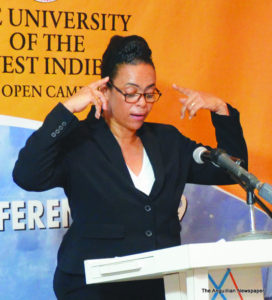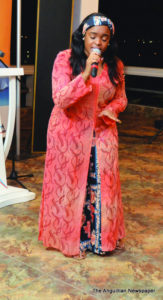
The opening ceremony of the Anguilla Country Conference, a community-based research and information sharing event, under the auspices of the University of the West Indies Open Campus, took place last Wednesday evening, October 23rd, at La Vue Boutique Inn.
The theme of the Conference was “Communities at Crossroads: Change the Thinking, Change the Future”. According to UWI Open Campus Country Manager, Mrs. Phyllis Fleming-Banks, “The aim and purpose of the Country Conference was to generate research in order to obtain concrete evidence about what our young people are interested in; why are the young men not looking to go into tertiary education – or what it is that they are seeking.”
The Conference spanned three sessions which ended on Friday, October 25th, with several local and international researchers presenting.
At Wednesday evening’s function several noteworthy items were presented. Among them were: a hearty prayer of invocation by Rev. Lindsay Richardson; a dramatic display by the theatrical group STAGES Anguilla; stirring calypso renditions by young Aaliyah Webster and Roxanne Webster; and remarks by Premier Victor Banks. But the highlight of the evening was the captivating keynote speech delivered by Mrs. Janine Edwards.
Mrs. Edwards is a native of Montserrat who migrated to Anguilla in 1998 in the aftermath of the Montserrat volcano eruption. Upon completion of her studies at York University, she worked in the financial sector and the hospitality industry. With her husband, Ian, Janine is co-proprietor of the renowned architectual and construction company, Sunset Homes, and she is currently the Vice President of the Anguilla Hotel & Tourism Association.
The substance of Mrs. Edwards’ speech was evidently well- researched. And her delivery was equally riveting. She passionately drove home the viewpoint that as a forward thinking community, in the 21st century, Anguilla must rise to the occasion of being competent with other worldwide communities in this global village where our thinking must change from an “inside the box” type of mindset.
Mrs. Edwards began: “A new world order has been unleashed. Change is the new constant and the new constant is change. Disruption is the new constant and the new constant is disruption. Massive political, economic, technological and social forces are at play, making much of what we know as “usual”, increasingly irrelevant and, indeed, each day becoming increasingly obsolete.
“Our communities are now at multiple crossroads, and we must mindfully reflect on the current dynamics, take stock, and intentionally and proactively decide what choices we have to make as a nation — and as part of a wider network of nations. We are responsible for carving out a desired and sustainable package of quality life on all fronts for our people.”
She continued: “Ladies and gentlemen, we live in an era of disruption in which powerful worldwide forces are changing how we live, breathe and work. The rise of China, India, and other emerging economies; the rapid spread of digital technologies; the growing challenges to globalization; and the fracturing of long-held alliances are throwing major tantrums which are forever changing the face of our communities.
“Economically, significant shifts are unfolding. There are changes in demographics and national policies, and dynamic markets are throwing curve balls and creating unprecedented changes in which nations are experiencing decline and growth as economic indicators. Emerging economies, led by China and India, have accounted for almost two-thirds of global GDP growth, and more than half of new consumption in the past 15 years. Economic power bases are indeed shifting.
“Ladies and gentlemen, major changes are happening in the world which have critical implications on how we live in Anguilla. At this crossroad, it is imperative that we intentionally reflect on the way we think. We must alter our individual and national collective mindsets. We need to actively embrace ‘The Mindset Advantage’ so that our mental frame can positively determine our behaviour, performance and success. Yes, we must ‘change our thinking’, so we can ‘change our future’.”

Mrs. Edwards stressed: “We need to use our small size, to our advantage — to be nimble, decisive and action-oriented. We need to reframe our minds and redirect the tendency we have to impose limitations on ourselves because of our size. Ask David how he showed Goliath that small size, combined with carefully considered and executed strategy, can move and shake the world. Mindset is everything. Mindset, coupled with consistent action, is the key to achieving and sustaining success. We must re-condition the mind, for the mind controls our very pattern of thinking, steers our decisions and creates resulting actions.
“As a nation, we need to embrace this shift in paradigm. We require a multi-dimensional collaborative mindset to navigate the external turbulence and increase our threshold of performance and success in all areas. Adjusting the mindset provides us with powerful forces across the board which can apply to an individual, a company, an NGO, a government, a grassroots community group, a nation — all of us. In order see the benefits of change, it’s time to think outside the box.
“But if we are loyal guards, always protecting the status quo of how we conventionally or traditionally think and act, if we have zero or little tolerance for risk, new ideas, or any attempt to rock the boat to find a better way, then we condemn ourselves to becoming obsolete.
“Nearly two decades into the digital revolution, the Caribbean finds itself technologically behind. Hence, today we are at a crossroads. More and more traditional jobs are disappearing, and the global economy is increasingly run on knowledge and skills that require significant investment in education and digital infrastructure. We need to remove any road blocks and mind blocks that we may have in moving with 21st century technology.”
While Mrs. Edwards’ speech went on to expound a host of other valuable points, and while those present intermittently applauded her passionate presentation, it is perhaps her reference to 21st century technology that explains the reasoning why our young men need to embrace the opportunities for tertiary education for equipping themselves and developing our nation.
As UWI’s Country Manager, Mrs. Phyllis Fleming-Banks noted previously, “We must know what our young men are seeking.” Let us therefore do what we can to help them “change their thinking and change their future” so that the framework of our nation’s future would be well sustained.
Staff Reporter, James R. Harrigan








